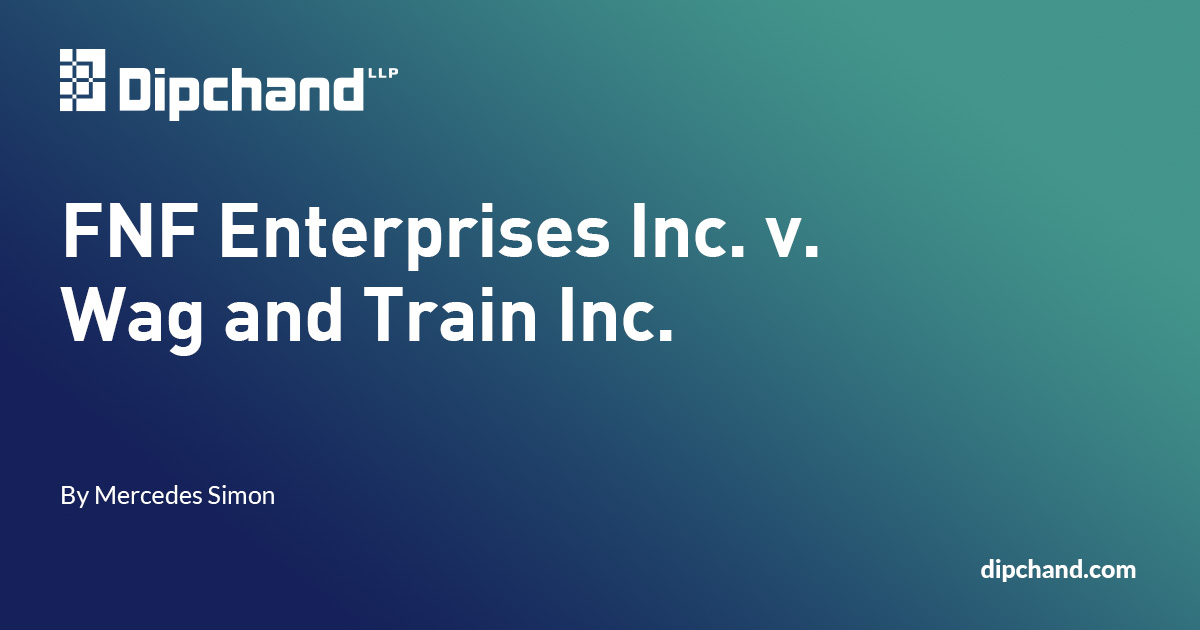By Mercedes Simon
A recent Ontario Court of Appeal (“ONCA”) decision, FNF Enterprises Inc. v Wag and Train Inc., 2023 ONCA 92, helps further clarify the longstanding doctrine of corporations’ separate identity. However, the case provides an interesting application to the oppression remedy, here for a commercial landlord pursuing a claim against a sole director who intentionally value-stripped their corporation.
The Facts
The appellants were landlords who leased their premises to the respondent- sole director Linda Ross, who was operating a dog grooming, training and day care business called “Wag and Train”. A year out from the lease’s expiration, the premises were abandoned, left in poor condition; and no further rent was paid. Simultaneously, the business moved to another location in the same municipality under a different name.
In their claim, the appellants also argued Ross knowingly stripped value from Wag and Train and moved her business elsewhere, in full knowledge of her liabilities against and breach of the lease.
Piercing Corporate Veil Will Not Be Successful…
The motion judge found the corporate veil should not pierced, and the ONCA agreed but on different grounds. In the lower court decision, piercing the veil was refused as the appellants had not disclosed any fraud or improper conduct by Ross, nor anything in her conduct suggesting a separate identity from the corporation.
Instead, the ONCA applied the two-part test set to pierce the corporate veil, namely:
- The corporate form is being abused to the point the corporation is no longer truly separate (this must also go beyond ownership or control into complete domination or abuse of the corporate form); and
- There was fraudulent or improper conduct giving rise to liabilities the plaintiff seeks to enforce.
Here, the appellants claimed Ross was liable for obligations incurred by breaking the lease, including arrears of rent, costs to repair the premises and the remainder of rent owing under the lease up to the end of the term. The conduct relied upon was Ross’ controlling interest as its sole director, therefore making the decision to break the lease and strip it of value.
The ONCA rejected this claim, stating Ross’ decision to break the lease should not raise to the level of piercing the corporate veil as the conduct was insufficiently fraudulent or improper.
Secondly, the corporate veil could not be pierced as it regarded value-stripping. Because Ross stripped value from Wag and Train while aware of its lease liabilities, this was distinct from inciting a breach by stripping value from the business. Unlike in previous cases, an explicit link between the liability and the wrongdoing was not present. Here, Ross began value stripping after, not concurrently, to the lease liabilities arising.
…But an Oppression Remedy Claim Might
Secondly, the ONCA rejected the lower court’s findings that the appellants had no grounds for an oppression remedy. Firstly, the ONCA applied the two requirements for an oppression remedy claim under s. 248 of the Ontario Business Corporations Act (“OBCA”):
- The complainant must identify the expectations it claims have been violated by the conduct of the respondent, and those expectations were reasonably held; and
- The complainant must show the reasonable expectations were violated by corporate conduct that was oppressive, unfairly prejudicial or disregarded the interested of any security holder, creditor, director, or officer.
For the remedy to be granted against a director, the individual must have had the requisite degree of involvement in the oppressive conduct so it may be attributed them; and personal liability is fit given the circumstances.
Here, the appellants were creditors whose interests had been unfairly prejudiced and disregarded. Ross’ actions as sole director meant that the appellants’ interests were compromised by unlawful internal corporate “manoeuvring” which the appellants were unable to protect themselves against.
More to the point, Ross was not entitled as sole director to use Wag and Train funds as if they were her own. The ONCA reminded us that the power to declare a dividend to shareholders is contingent on being able to pay creditors (here, the appellants), and shareholders do not enjoy this right to assets while the corporation is ongoing. As a result, the court found the oppression remedy test was met.
So, while FNF Enterprises may relieve directors of smaller corporations as to their personal liability, a personal remedy could be found if reasonable expectations of a complainant were violated by oppressive conduct.



